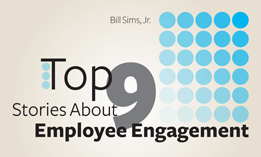May I have the Darts & Blindfold Please?
“I’m trapped in a self-perpetuating nightmare Bill.”
So began my chat with a safety manager of a Fortune 1000 company. His boss had directed him to implement a safety bingo program. Against his better judgment, he did.
“At first, the program cut our injuries, but then we had a lost time injury (LTI), and the game ended. Then the injuries came out of the woodwork. 4 LTI’s in one week. If that’s not a sign we have injury hiding, what is? To make matters worse, I’m worried that we are sending a message to our employees that staying safe is a result of chance, or being “lucky”—while I know that safety results from a pursuit of safe behavior.”
This manager went on to lament the problems with the bingo concept. For those of you who don’t understand the game, it works like this:
- Every day without an injury, a number is pulled and posted by the employee time clock. A bingo jackpot is established with money or some other prize that increases each day no injury is reported (translation: hide injuries and the award prize gets bigger for all of us)
- Employees are given a bingo card with a series of random 2 digit numbers and if they get a match they scratch out the number on their card.
- Achieving 5 numbers in a straight line means that employee can bring the card in to claim the jackpot prize.
There are countless variations of this system that circulate—safety poker, jackpot, in house drawing programs, and the like.
Why do these incentive approaches work at initially and then quickly fizzle out?
First, let’s explore what these approaches have going for them:
- They provide feedback to tell the group how the safety record is doing
- They provide a reward or positive consequence for improving performance
- They provide novelty or something “new” a known factor in human behavior.
These elements help to ensure some early impact. And for many companies, these programs are their first foray into the world of incentives. They are often companies who experience many “Monday Morning Injuries” (workers who milk the work comp system to get a few days off from work with pay). Creating a system where peer pressure causes co-workers to look down on those who lose the team’s safety bonus is a highly effective way to eliminate the Monday Morning Injury. Not a few safety managers have had employees approach them to report a co-worker who is faking an injury. The bad apples are thus weeded out. And the safety record “improves” or so it may seem.
Soon, however, the “low hanging fruit” of Monday Morning Injuries disappears, and the company is left with an environment where the remaining injuries are not a result of questionable worker behavior, but are caused instead by unsafe conditions & behaviors. And these injuries are often hidden due to the peer pressure mentioned above, instead of being reported so that they can be prevented in the future.
But all the old school senior managers remember is how they dropped those injuries so much with their first “incentive fix”.
“You won’t believe what they’ll do for a ball cap!” says the vintage 80’s manager. (sigh…)
Another problem with games of chance is that one person wins, while everyone else (or almost everyone else) loses. Due to this being an uncertain consequence, you inevitably will see a lack of interest in playing “the game”. You will begin to see Scratch off cards in the trashcan and Bingo cards on the floor.
One of my good friends Jerry Howell had a young female employee start to cry when she failed to win the “safety prize”. In a desperate attempt to assure her the game wasn’t “rigged” he went through 1800 names in the hat and told her that if her name wasn’t in the bunch, he would personally give her $50.
Next, the disenchanted safety director announces the Bingo game is canceled…only to be met by a howl of protest from the CAVE people (Citizens Against Virtually Everything) who have been picking up the discarded scratch offs and bingo cards from the trashcan to line their own pockets. Frequently, these vocal few make so much noise that the game gets reinstated, although it has zero impact on behavior.
“Bill, I swear, I could have a bigger impact on our safety performance if my boss would just blindfold me and let me throw a dart into a group of my employees, but what can I do?”
And so my conversation with this safety director ended. I hope that someday he can convince his boss to leave behind the games of chance and lagging indicator rewards. But just in case he can’t, keep an eye out for a blindfolded guy throwing darts. You might have your own near miss or worse….we wouldn’t want you to lose your ball cap now would we?
You can follow any responses to this entry through the RSS 2.0 feed. You can leave a response, or trackback from your own site.
